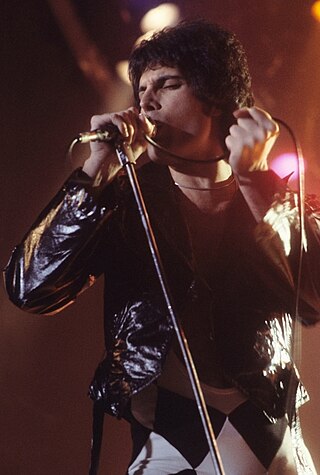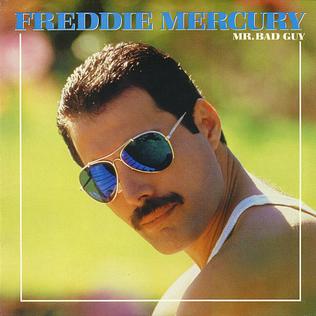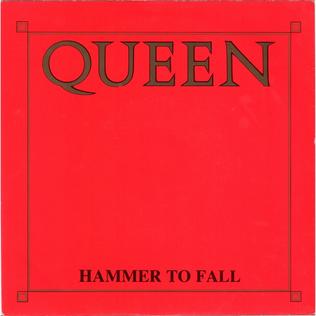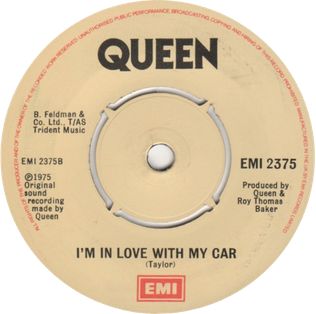
"Bohemian Rhapsody" is a song by the British rock band Queen, released as the lead single from their fourth studio album, A Night at the Opera (1975). Written by lead singer Freddie Mercury, the song is a six-minute suite, notable for its lack of a refraining chorus and consisting of several sections: an intro, a ballad segment, an operatic passage, a hard rock part and a reflective coda. It is one of the few progressive rock songs of the 1970s to achieve both widespread acclaim and commercial success, and appeal to a mainstream audience.

Queen are a British rock band formed in London in 1970 by Freddie Mercury, Brian May, and Roger Taylor, later joined by John Deacon (bass). Their earliest works were influenced by progressive rock, hard rock, and heavy metal, but the band gradually ventured into more conventional and radio-friendly works by incorporating further styles, such as arena rock and pop rock.

Freddie Mercury was a British singer and songwriter who achieved worldwide fame as the lead vocalist and pianist of the rock band Queen. Regarded as one of the greatest singers in the history of rock music, he was known for his flamboyant stage persona and four-octave vocal range. Mercury defied the conventions of a rock frontman with his theatrical style, influencing the artistic direction of Queen.

The Freddie Mercury Tribute Concert for AIDS Awareness was a benefit concert held on Easter Monday, 20 April 1992, at Wembley Stadium in London, England, for an audience of 72,000. The concert was produced for television by Ray Burdis, directed by David Mallet and broadcast live on television and radio to 76 countries around the world, with an audience of up to one billion. The concert was a tribute to Queen's lead vocalist, Freddie Mercury, who died of AIDS on 24 November 1991.

"Under Pressure" is a song by the British rock band Queen and singer David Bowie. Originally released as a single in October 1981, it was later included on Queen's 1982 album Hot Space. The song reached number one on the UK Singles Chart, becoming Queen's second number-one hit in their home country and Bowie's third, and also charted in the top 10 in more than 10 countries around the world.

A Night at the Opera is the fourth studio album by the British rock band Queen, released on 28 November 1975 by EMI Records in the United Kingdom and Elektra Records in the United States. Produced by Roy Thomas Baker and Queen, it was reportedly the most expensive album ever recorded at the time of its release.

Mr. Bad Guy is the only solo studio album by British musician Freddie Mercury, lead singer of Queen. Released in 1985, during a period in which Queen were on hiatus from recording, it contains eleven songs, all written by Mercury himself.

"Killer Queen" is a song by the British rock band Queen. It was written by lead singer Freddie Mercury and recorded for their third album Sheer Heart Attack in 1974. It reached number two in the UK Singles Chart and became their first US hit, reaching number twelve on the Billboard Hot 100. The song is about a high-class call girl and has been characterised as "Mercury's piano-led paean to a Moët-quaffing courtesan".

"Don't Stop Me Now" is a song by the British rock band Queen, featured on their 1978 album Jazz and released as a single on 26 January 1979. Written by lead singer Freddie Mercury, it was recorded in August 1978 at Super Bear Studios in Berre-les-Alpes (Alpes-Maritimes), France, and is the twelfth track on the album.

"These Are the Days of Our Lives" is a song by the British rock band Queen. Although credited to the whole band, it was largely written by their drummer Roger Taylor, and is the eighth track on the band's 1991 album Innuendo.

"Innuendo" is a song by the British rock band Queen. Written by Freddie Mercury and Roger Taylor but credited to Queen, it is the opening track on the album of the same name (1991), and was released as the first single from the album. The single debuted at number one on the UK Singles Chart in January 1991, the band's first number-one hit since "Under Pressure" nearly a decade before, and additionally reached the top ten in ten other countries. It is included on the band's second compilation album Greatest Hits II.
"The Prophet's Song" is a song by the British rock band Queen, written by their guitarist Brian May, originally released on their fourth studio album A Night at the Opera in 1975.

"Hammer to Fall" is a 1984 song by the British rock band Queen. Written by guitarist Brian May, the song is the eighth track on their 1984 album The Works. It was the fourth and final single to be released from that album, although the single version was edited down by thirty seconds from the version on the album. Different sleeves were used to package this single and the live picture sleeve is now a collector's item. The song harks back to the old roots of the band, being built around a hard angular and muscular riff.

"Somebody to Love" is a song by the British rock band Queen, written by lead singer and pianist Freddie Mercury. It debuted on the band's 1976 album A Day at the Races and also appears on their 1981 compilation album Greatest Hits.

"I'm in Love with My Car" is a song by the British rock band Queen, released on their fourth album A Night at the Opera in 1975. It is the album's only song written entirely by drummer Roger Taylor.
The Story of Bohemian Rhapsody is a 2004 documentary about the song "Bohemian Rhapsody", which was written by the lead singer of Queen, Freddie Mercury.

Marc Martel is a Canadian Christian rock musician. In 1999, he formed the band Downhere before going solo in 2013. Aside from his own work, Martel is known for his Queen covers and his vocal likeness to frontman Freddie Mercury. He provided some parts of Mercury's singing voice in the film Bohemian Rhapsody.

Bohemian Rhapsody is a 2018 biographical musical drama film that focuses on the life of Freddie Mercury, the lead singer of the British rock band Queen, from the formation of the band in 1970 to their 1985 Live Aid performance at the original Wembley Stadium. It was directed by Bryan Singer from a screenplay by Anthony McCarten, and produced by Graham King and Queen manager Jim Beach. It stars Rami Malek as Mercury, with Lucy Boynton, Gwilym Lee, Ben Hardy, Joe Mazzello, Aidan Gillen, Tom Hollander, and Mike Myers in supporting roles. Queen members Brian May and Roger Taylor also served as consultants. A British-American venture, it was produced by Regency Enterprises, GK Films and Queen Films, and was distributed by 20th Century Fox.














